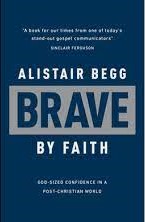
God is sovereign even in the face of circumstances that appear to be prevailing against his people
Alistair Begg’s book “Brave by Faith - God-sized confidence in a Post-Christian world” shows how the stories of the first seven chapters of the book of Daniel model the way we should live in a hostile culture set up to deny and defy God. He is not persuaded this is a ‘Dare to be a Daniel’ story and counsels against making heroes of Daniel and his friends. Throughout we should see that God did this, God did that.
“The overarching message is simply this: God is powerful, and God is sovereign, and even in the face of circumstances that appear to be prevailing against his people, we may trust him entirely. The battle may seem to be tilting against the church, but still God reigns supreme.” p7
In the face of pressure Daniel ‘draws a line’. There is no attempt to compromise. When he makes his stand before Nebuchadnezzar there’s something more at stake than changing his diet. Faced with creeping secularism we too will need to be brave and from a conscience moulded by God’s Word, sensitised by grace, work out where our lines are drawn.
Begg says the lines may be drawn in different places in different circumstances but crossed they must not be. One Christian teacher will resign when confronted by the transgender agenda, not having anything to do with it. Another may stay and seek to teach Christian ethics to those who would otherwise not hear that there is a different view. There are many contexts where the ‘should I stay or should I go?’ question arises. In each situation we must know our lines and that God will provide us with all we need.
With the benefit of hindsight we know the outcome when Daniel’s three friends faced the furnace. They didn’t know - rescue was not guaranteed. The point is that we are called to obey even when it likely won’t work out well for us. Daniel’s friends are not assuming it will: “O king, there is a God who can deliver us. And even if he doesn’t, we are not going to worship this golden idol”. p42
In the church we have been flagging up impending persecution for long enough. Those of us who just want to get on with the business of ministry should reflect on the fact that the full challenge may not be directly now but will surely come further down the line (Ian Paul). Begg says pragmatism is the enemy of obedience, “We are not called to be pragmatic but faithful.” p44. Today there are new power dynamics around for example inequality and oppression that have a chilling effect on belief generally, mutating into a form of authoritarianism. In contrast the scandalous power of the Cross and lowliness of the Saviour calls out vaunted pride and lack of humility be it in the power of an empire or at the root of imposed cultural values. The Cross is foolishness to those who demand signs and seek wisdom but is the power that delivers from the bondage of idols.
“Daniel had a sufficient fear of God’s judgment that he did not wish even on his enemy.” p56. Similarly, our role is to speak gospel truth where and when we can “with compassion and conviction and then to pray that God would be at work to open that person’s heart” p60.
If we insist that the God of the Bible is the God of the universe and our identity comes from Him and not from within us, then it will be deemed offensive, if understood at all, meeting with antagonism. That should not make us panic. Nor should it make us rude; Daniel replied to the man sent to kill him “with prudence and discretion” (Dan.2.14). “You will search in vain through the whole book that bears his name for one of God’s people responding aggressively, angrily or condescendingly to any pagan.” p31. Moreover, God brought Daniel favour (Dan.1.9) so that he could be a blessing to his captors, bringing unusual wisdom and insights surpassing that of the Babylonian elites.
Belshazzar, some 30 years later, displays the pride that projects greatness and “draws a crowd” with lots of glitter on the surface. When he becomes king Daniel’s God has fallen very much out of fashion and Daniel himself has been sidelined by the regime. Should he just blend in and not disrupt? How easy it is for cultural norms to be seen as common sense and normative. How easy it is for Daniel to be seen as a rebel - intolerant and bigoted. Would it not be disrespectful to challenge authority, perhaps jeopardising his fellow Jews in exile? Begg calls for Christians to stand firm and speak out. “The temptation to ‘soften’ the gospel in order for it to be acceptable to our world will be great after a season of being ignored …. better to have been sidelined and mocked than to have compromised and joined the party” p74,75.
Daniel in the lion’s den, is “absolutely not a nice story for children”. He’s now about 80 years old but old age is no excuse not to obey, nor face up to difficult decisions, says Begg, and proposes that (notwithstanding the intervention of the Holy Spirit) if you think you’re going to be something at 80 that you’re not now, you had better start playing catch up.
Daniel remained faithful: the winds of change did not move him. There’s a prophetic edge to this book that speaks to our times, both in the church and in the world. Above all, we should grasp the truth that “the Most High rules the kingdom of men and gives it to whom he will and sets over it the lowliest of men.” (Dan.4.17)